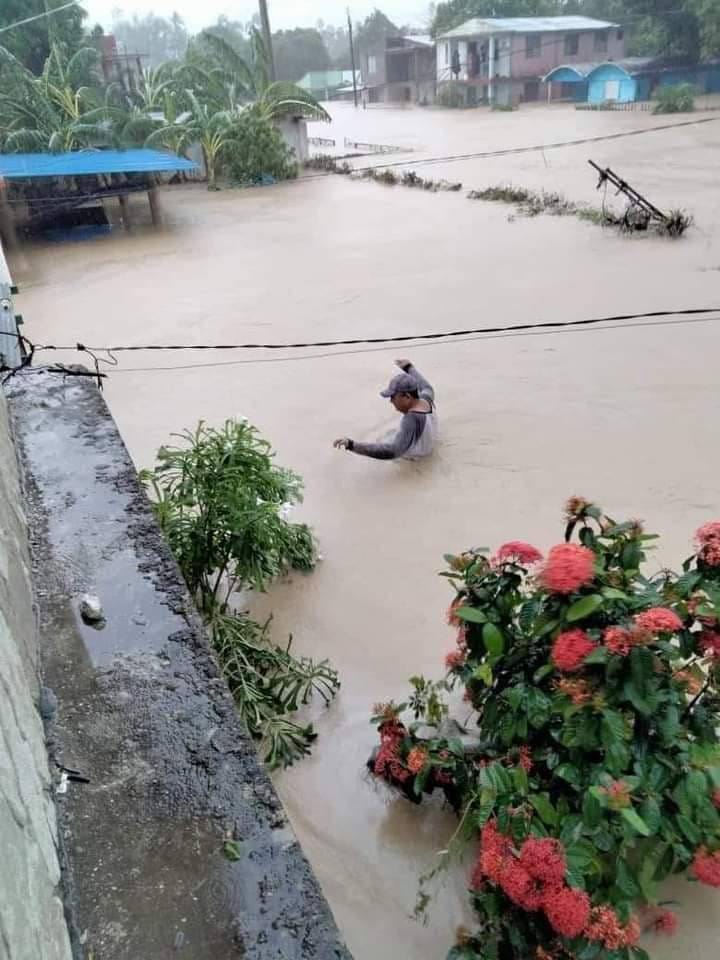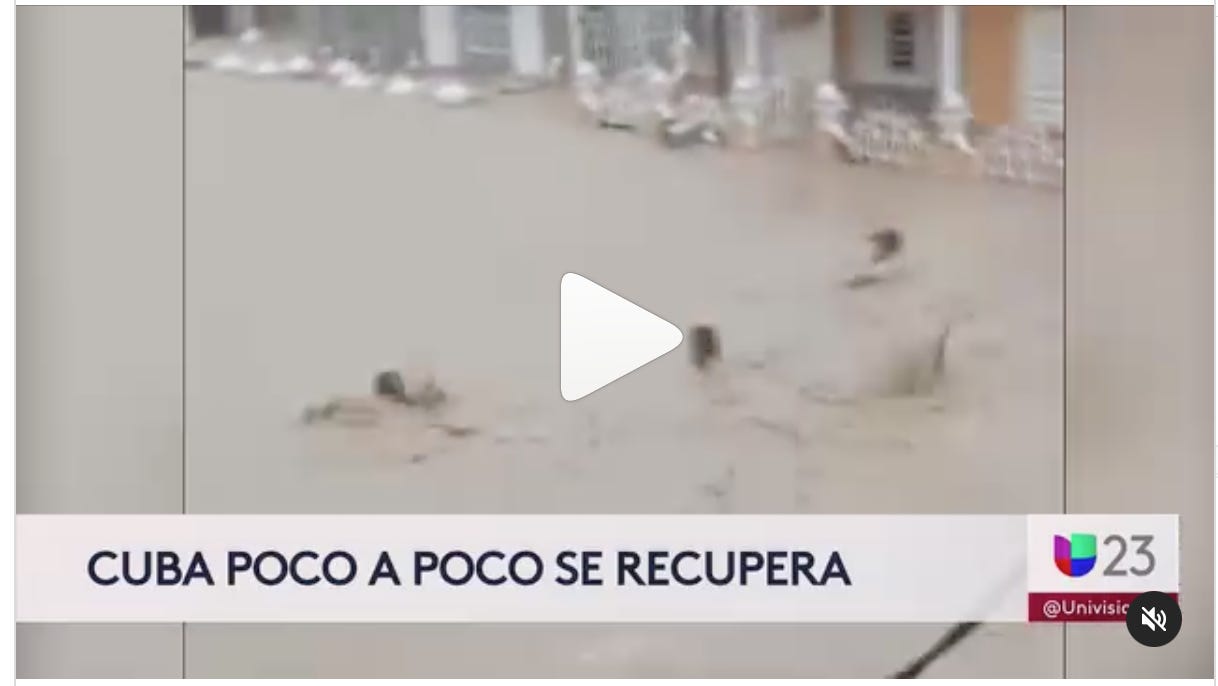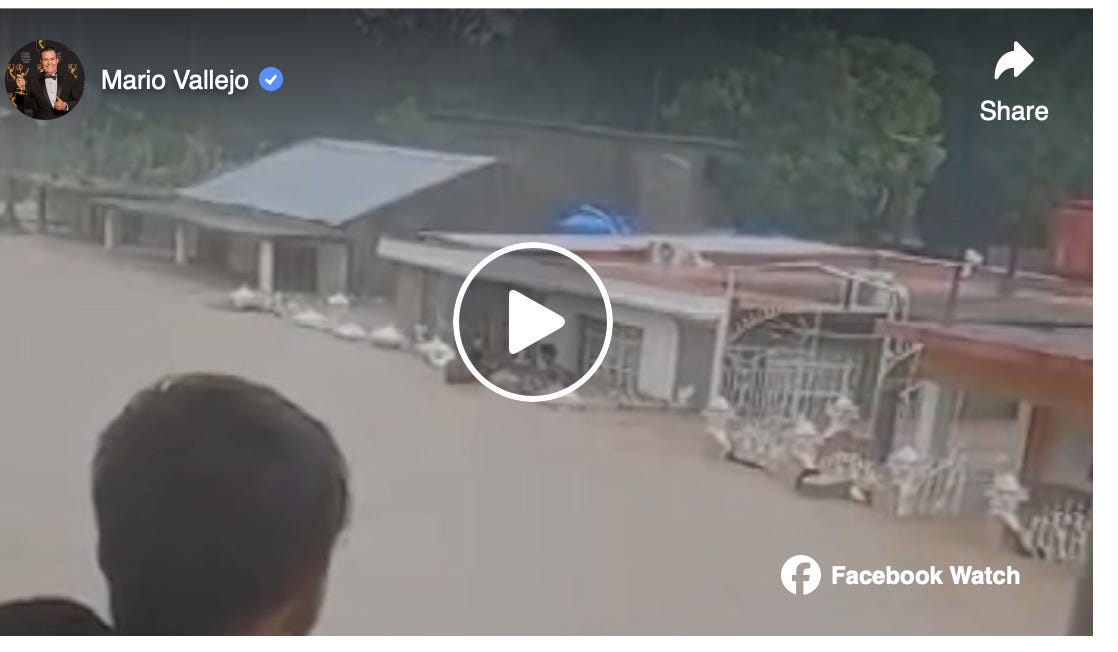What happened here is no one's fault—Cuban leader to devastated hurricane victims
CubaCurious 24 - 30 October 2024
Angry victims bravely scold Cuban president for failing to warn, aid them—but the buck doesn’t stop there.


With power restored in some parts of eastern Cuba, residents began uploading footage this week of the vast destruction caused by Hurricane Oscar. One widely circulated video shows chest-high water flowing through the streets of the village of San Antonio del Sur, in Guantánamo Province, as three teenagers swim through the current, struggling to go house to house, saving trapped neighbors and recovering bodies. In another video an angry woman weeps as she describes water rising quickly and almost drowning. “They [authorities] say six died. No. No. A whole bunch of people lost their lives here.”
The narrators’ voices share the same hopeless, heartbroken tone. But there’s something else there, a note of abandonment, of being forgotten. While many Americans—and just yesterday, Spaniards—suffered horrible losses in the recent storms, our government—as imperfect as it is—tried to inform, warn, evacuate, rescue, shelter, feed and clothe as many victims as possible.
A flash flood, an earthquake, those are unpredictable. Days before Oscar made landfall, storm trackers across the Caribbean were reporting it would be heavy rains and flooding, not wind, that would cause devastation. There was enough time, but not enough will—or organization—to warn Cuban citizens directly in the path of the storm.
Unlike in times of other disasters, when officials arrive at staged scenes and are thanked by victims of the storms, residents tried to take officials to task for the government’s abject incompetence.
Three days after the storm hit, Cuba’s appointed president, Miguel Díaz-Canel, dressed in the military uniform so many Cubans fear, arrived to inspect the damage in eastern Cuba. He came empty handed, but he made up for it with the large military, security, and media entourage he brought with him. As always, the government’s team is easy to identify in the footage: well-fed, muscular men with big bellies wearing clean, neatly pressed clothes. Video below of the entourage arriving in one hard-hit area. Revolutionary slogans are heard in the background, presumably not from the storm’s victims.
Mario J. Pentón, a Miami-based reporter for the Spanish news station America TeVé, examined the jumpy footage and deciphered the mumblings of the president as townspeople dared complain to him, repeatedly interrupting as he gives excuses for the destruction and loss of life they suffered. Cubans on the island trust Pentón with their stories. This report is an example of why they risk reprisals. They know he’s committed to giving them a voice.
I’ve translated some of the victims’ stories and excerpted Pentón’s report below.
A woman, speaking rapidly and gesturing, confronts Díaz-Canel and points to her son, off camera. “Look. Look at my son. I don’t have food. I haven’t had water in several days.” Díaz-Canel asks if she heard the talk he’d just given. “Um. No. I just got here.”
“We’re bringing in water, food, milk . . .” he says, adding, “What happened here is no one’s fault.”
No one’s fault? For the national electrical grid collapse? For not informing these people? For not flying out in the regime’s expensive Russian military helicopters to at least warn people or bring them supplies?
The angry woman keeps scolding Díaz-Canel , “I’ve got a sick person at home, in bed! What do I feed him. What do I feed him!”
A man steps up to Díaz-Canel, cautious but determined to tell his story. “They [a team of government workers] left us completely alone. Twenty-nine children,” the man says. His voice breaks as he says, “I myself saved my five children. We almost drowned. The government abandoned us. They left us at the school, evacuated us there. Then they abandoned us. There was no one. Twenty-nine children. I myself had to go back and rescue them. All of them . . . hypothermic.”
Díaz-Canel mumbles, “Well, they evacuated you to the school. What happened is, the water exceeded what we had expected.”
As if this distraught man, who saw his children almost drown, needed to be told there’d been a flood.
The soft-spoken man refuses to give in and interrupts Díaz-Canel. “But . . .they said they’d leave a team and they didn’t. They abandoned us. They left us completely alone.” His voice trembles as he insists: “They told us they’d be back. But they abandoned us.”
Another man rebukes Díaz-Canel for not informing citizens ahead of time. He reminds him that without electricity the townspeople had no way of knowing what was coming, and no one came to tell them, or made any announcements. The president tries to interrupt—“We had two complicated problems that came at the same time” (national power grid failure and a hurricane).”
The man adjusts his cap nervously and talks over Díaz-Canel’s excuses. “The authorities had to know that it [the storm] was moving slowly,” he said. “Nine kilometers an hour. At that pace they had to know it was going to unleash all its fury on us. They knew. They knew it was coming from the north. I’m not afraid of even a Category 5 if it comes from the south. The water falls this way,” he said, indicating the angle at which the rain falls in those storms, “and the river doesn’t grow. But from the north? When I saw that, I told myself, “Now we’re in for it.”
To that knowledgeable, humble man, Cuba’s chief of state says, “We’re going to study all of that.” But the man simply doesn’t accept Díaz-Canel’s excuses.
“They knew what was coming. They knew it was coming from the north. They needed to come and evacuate us. They had to get everybody out of here!”
“We’re going to analyze that,” Díaz-Canel answers.
Pentón, the reporter, wonders: Why are you there telling these people that food and water are on the way? Why are you there to talk with them instead of helping them solve their problems. It’s been three days! Why haven’t you asked the US for humanitarian aid? Why do you turn the other way when that opportunity is on the table, waiting for you to ask? Why do you instead write on X, If the US wants us to ask for something, here’s what we ask: #EndtheEmbargo.

With all the repressive apparatus you use to control the country, you couldn’t find the resources to evacuate these people, to help them prepare? No and not a single word about accepting responsibility.
The president’s visit to the region topped the news in Cuba. “We’re restoring power,” he says in a clip showing bodyguards behind him. “There’s a lot of solidarity with San Antonio. You’re not alone. But, well, we have to be tough, and keep going, just like you’re all doing here.”
A final image from one of the clips. A woman wades in chest deep water inside her house. Her child is perched on a tall cabinet. A man sits at the top of wall, where it had met the ceiling of the simple home. The woman calls through her window, asking if her neighbor is ok. The man lets loose a torrent of insults against the government. “Here we are. Alone. No one came here. No one is coming. Not the fucking government, not the fucking Party. Those bastards don’t care, they left us alone. Children without food, cold. Show them the girl.”
The woman turns the phone toward the child on top of the cabinet, who is shivering. She looks at the water and says, “It’s rising. It’s rising.”




